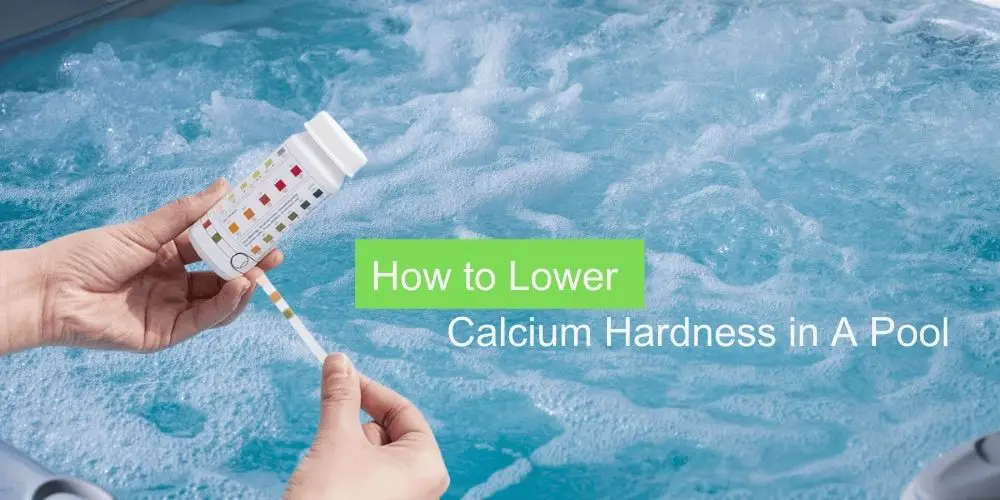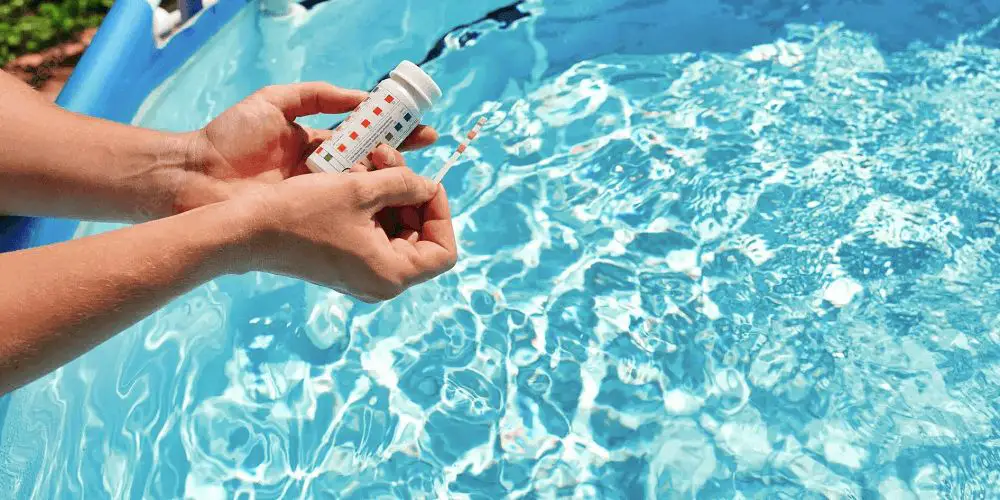
Having a pool is a great way to relax and enjoy summer. However, maintaining the water quality is essential to ensure the longevity of your pool and the comfort of swimmers.
One important factor to consider is the calcium hardness level in your pool. In this article, we will discuss what calcium hardness is, why it is important to manage it and provide effective methods to lower calcium hardness in a pool.
6 Causes of High Calcium Hardness
High calcium hardness in your pool can occur due to several factors. Understanding these causes can help you effectively manage and prevent the issue. Here are some common reasons for high calcium hardness:
1. Hard Water Fill
Filling your pool with hard water containing a high concentration of dissolved minerals, including calcium, can result in elevated calcium hardness levels. Hard water is often sourced from well water or regions with naturally high mineral content in the water supply.
2. Chemical Additives
Certain pool chemicals additives, such as calcium hypochlorite or calcium-based shock treatments, can increase calcium hardness over time. These products contain calcium compounds that dissolve in the water, raising the calcium hardness level.
3. Evaporation and Water Replacement
As water evaporates from your pool, the calcium, and other minerals remain behind, gradually increasing calcium hardness. If you regularly top up your pool with hard water to compensate for evaporation, it can further contribute to rising calcium hardness levels.
4. pH and Alkalinity Imbalance
Imbalanced pH and alkalinity levels can affect calcium hardness. When the pool water’s pH and alkalinity are too high, calcium can precipitate out of the water and form scale on pool surfaces, resulting in increased calcium hardness.
5. Lack of Pool Maintenance
Inadequate pool maintenance practices, such as insufficient filtration and improper water chemistry balance, can accumulate calcium and other minerals in the water. Neglecting regular brushing and cleaning of pool surfaces can also contribute to calcium buildup.
6. Local Water Conditions
The natural mineral content of the water supply in your area can influence the calcium hardness level. Some regions have naturally high calcium levels in their water sources, which can impact your pool’s calcium hardness.
How to Lower Calcium Hardness in A Pool?

Lowering calcium hardness in your pool is essential to prevent issues such as scaling and maintain balanced water chemistry. Here are several effective methods to lower calcium hardness:
1. Dilution
One straightforward approach is partially draining and refilling your pool with fresh water. By diluting the existing pool water, you can reduce the concentration of calcium and other minerals. However, this method may not be suitable for everyone, especially those facing water conservation restrictions.
2. Using a Calcium Reducer Product
Calcium reducer products are specifically designed to lower calcium hardness levels in pool water. These products work by binding with excess calcium ions, allowing them to be filtered out. Follow the manufacturer’s instructions for proper usage and dosage.
3. Reverse Osmosis
Employing a reverse osmosis (RO) system is a highly effective method for reducing calcium hardness and other contaminants from pool water. An RO system utilizes a semipermeable membrane to remove impurities, including excess calcium. Contact a professional pool service to install and operate an RO system for your pool.
4. Balanced Water Chemistry
Maintaining balanced water chemistry is crucial for managing calcium hardness. Regularly test and adjust your pool’s pH, alkalinity, and other chemical levels. Optimal ranges for these parameters will help prevent calcium buildup and maintain water clarity.
5. Preventing Calcium Buildup
To prevent future issues with calcium hardness, it’s important to take preventive measures. Regularly brush pool surfaces to remove any calcium deposits, and use a scale inhibitor product to inhibit scaling. Additionally, ensure proper pool filtration and circulation to minimize calcium buildup.
Seeking technical Assistance
If you’re unsure about how to lower calcium hardness effectively or facing persistent issues, it’s advisable to seek professional assistance from a pool service.
They can provide expert advice, perform accurate water testing, and offer specialized treatment options for managing calcium hardness.
Negative Effects of High Calcium Hardness in Pools
High calcium hardness in your pool can lead to several negative effects that can impact the overall condition and enjoyment of your pool. Here are some of the negative consequences of high calcium hardness:
1. Scaling
High calcium hardness can cause scaling, forming white, crusty deposits on pool surfaces, equipment, and plumbing. Scaling can make your pool appear unsightly and can be difficult to remove. It can affect the smoothness of pool surfaces, leading to discomfort for swimmers and potential damage to pool equipment.
2. Reduced Water Clarity
Excessive calcium hardness can contribute to cloudy or hazy pool water. The presence of dissolved calcium minerals can interfere with the effectiveness of water filtration and reduce water clarity. This can make it less appealing for swimmers and affect the overall aesthetic of your pool.
3. Clogged Pool Equipment
High calcium hardness can accumulate calcium deposits within your pool equipment, such as pipes, filters, and heaters. These deposits can clog the equipment, impairing its functionality and potentially causing damage. Clogged equipment may require costly repairs or replacement.
4. Diminished Chlorine Efficiency
Excess calcium in the water can hinder the effectiveness of chlorine disinfection. High calcium hardness can reduce the ability of chlorine to sanitize the pool properly, leading to inadequate disinfection and potentially allowing the growth of algae and bacteria.
5. Difficulty in Maintaining Balanced Water Chemistry
High calcium hardness can disrupt the balance of other essential water chemistry parameters, such as pH and alkalinity. It can make it more challenging to maintain optimal water chemistry levels, leading to additional problems such as increased scaling, reduced chlorine efficacy, and compromised water clarity.
6. Increased Maintenance and Cleaning Requirements
Dealing with the consequences of high calcium hardness, such as scaling and cloudy water, requires additional maintenance efforts. It may involve more frequent brushing, cleaning, and the use of specialty chemicals to remove scale deposits and restore water clarity.
FAQs: Lowering Calcium Hardness in A Pool
1. What chemical lowers calcium hardness in a pool?
Muriatic acid is a chemical that lowers calcium hardness in a pool.
2. Is it OK to swim in a pool with calcium?
It is recommended to wait for 2-4 hours after applying calcium before swimming.
3. Does rainwater increase calcium in the pool?
No, rainwater does not increase calcium in a pool.
4. Can you swim in a pool with high hardness?
Swimming in a pool with high hardness (excess calcium) can be harmful to your health and the pool’s condition.
Final Thoughts
Maintaining appropriate calcium hardness levels is paramount for your pool’s overall health and longevity. Understanding the causes and negative effects of high calcium hardness and implementing the recommended methods to lower it can ensure a well-balanced pool environment.
When needed, regular testing, preventive measures, and professional assistance will contribute to a pleasurable and hassle-free swimming experience.

Hi, This is Josh. I am a former competitive swimmer and current fitness enthusiast.
I created this site to share my love of swimming with the world!

